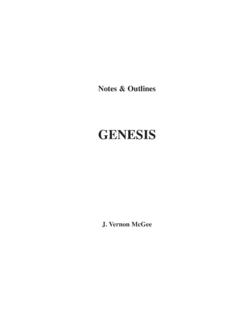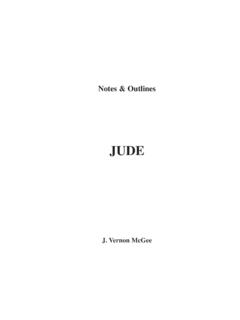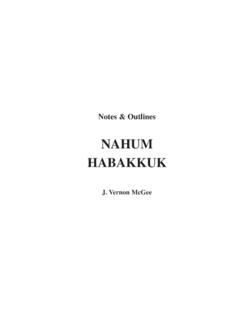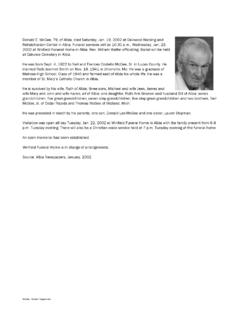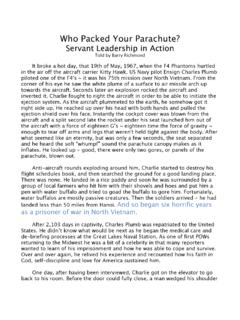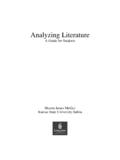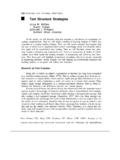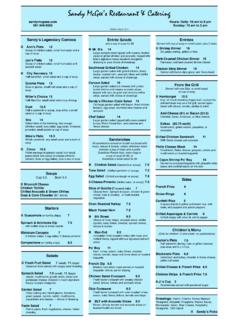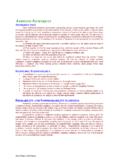Transcription of 1 & 2 SAMUEL - J. Vernon McGee
1 Notes & Outlines 1&2. SAMUEL . J. Vernon McGee 1 & 2 samuel . I gave thee a king in mine anger, and took him away in my wrath. (Hosea 13:11). The Books of 1 and 2 samuel give us the origin of the kingdom. The two Books of SAMUEL were classified as one in the Jewish canon. They are the first two of four Books of Kings in the Latin Vulgate. WRITER: The name of SAMUEL is identified with these two historical books, not because he was the writer primarily, but because his story occurs first and is so prominent. He anointed as king both Saul and David. SAMUEL is considered the author up to 1 SAMUEL 25 (his death). Nathan and Gad com- pleted the writing (1 Chronicles 29:29 ASV). FEATURES: 1. The rise of the kingdom. 2. The story of Hannah. 3. The story of little SAMUEL . 4. The story of David and Goliath. 5. The friendship of David and Jonathan.
2 6. King Saul's visit to witch of Endor. 7. God's covenant with David in 2 samuel 7. 8. David's great sin Bathsheba. 9. David's rebellious son Absalom. THEME: Prayer 1 SAMUEL opens with prayer; 2 samuel closes with prayer. Kingdom The change of the government from a theocracy to a kingdom;. God's covenant with David. Prophet The rise of the office of prophet, who became the messenger of God in place of the priest. KEY VERSE: 1 SAMUEL 10:25. COMMENT: There is a striking contrast between the characters in the Book of Judges and those in the two Books of SAMUEL . The men in Judges seem to be ordinary and average, while here the characters are outstanding and above the aver- age. There are 6 who stand out in 1 SAMUEL . They are Hannah, Eli, SAMUEL , Saul, Jonathan, and David. First SAMUEL is a transitional book from the era of the judges to the kingdom.
3 The kingdom foreshadows the coming mil- lennial kingdom in some respects. There are certain profound global lessons for us in the setting up of the kingdom. The world needs: 1. A king with power who exercises his power righteously;. 2. A king who will be in full dependence upon God and who can be trust- ed with power; and 3. A king who is in full obedience to God. CHAPTERS AND VERSES WORTH REMEMBERING: 1 SAMUEL 15:22 SAMUEL 's word about obedience 1 SAMUEL 25:29 Abigail's word about David's relationship to God 2 samuel 3:33 Abner's epitaph 2 samuel 7 God's covenant with David (note the 7 I wills ). 2 samuel 18:33 David's grief over Absalom 2 samuel 22 Song of David (Psalm 18). 2 samuel 24:24 David's rebuke against a cheap religion 1 SAMUEL . COMMENT: I. SAMUEL : God's prophet, priest, and judge, Chapters 1 8. Chapter 1 This First Book of SAMUEL opens with a cry of a godly woman.
4 While the people cry for a king, Hannah cries for a child. God builds the throne on a woman's cry. When woman takes her exalted place, God builds her a throne. Eli, the high priest, thinks Hannah is drunk as she prays before the taber- nacle in Shiloh. When he discovers her true anxiety is for a child, he bless- es her. SAMUEL is born to Hannah and she brings him to Eli in fulfillment of her vow. Chapter 2 Hannah's prayer of thanksgiving is prophetic, as she mentions the Messiah for the first time (v. 10). Eli's sons are evil and not fit for the priests' office. An unnamed prophet warns Eli that his line will be cut off as high priest and that God will raise up a faithful priest (v. 35). Notice verse 26 spoken only of SAMUEL and Jesus. Chapter 3 The story of the call of SAMUEL as a prophet-priest is ordinarily reserved for children.
5 It is not only for the junior, but for the senior. Bring it out of the nursery and into the adult department, for it is not only a beautiful story but marks one of the great transitional periods in Scripture the change from theocracy to monarchy, from priest to king. God spoke to a king through prophets. SAMUEL was not a wee child. Josephus says he was 12 years old (2:18 gives the wrong impression). Solomon was a grown man when he prayed, I am but a little child (1 Kings 3:7). Jeremiah was called to prophetic office when he wrote, I am a child . (Jeremiah 1:6). There was a total of 4 calls to SAMUEL : first and second were the call of God to salvation (v. 7); the last two calls were to service (v. 10). Chapter 4 Israel, without consulting SAMUEL , goes out to battle against the Philistines which leads to defeat. Then they bring the ark of the covenant into battle, thinking its presence will bring victory.
6 This reveals the superstitious paganism of the people who thought there was some merit in an object. The merit was in the presence and person of God. Verse 5 reveals gross idolatry. Verses 6 through 8 show that the Philistines were both superstitious and ignorant. Verse 10 tells Israel's defeat again. The ark is captured. Verse 18 The capture of the ark causes Eli to collapse and fall back- ward, breaking his neck (he was a fat man). Chapter 5 The captured ark is placed in the house of Dagon, idol of the Philistines. The idol falls over and breaks. In fear, they send the ark to Gath where it is then transferred to Ekron. Chapter 6 Philistines return the ark to Israel, carried on a cart, to the field of Joshua at Bethshemesh. The ark is transferred to Kirjath-jearim. Chapter 7 After 20 years Israel prepares to receive the ark.
7 Israel turns from Baalim and Ashtaroth to serve the Lord (v. 4). After Israel's victory over the Philistines, SAMUEL sets up a stone at Ebenezer, which means Hitherto hath the Lord helped us.. Verses 15 through 17 give SAMUEL 's extensive ministry as prophet, priest, and judge. Chapter 8 Hosea 13:11 can be written over the remainder of 1 SAMUEL : I gave thee a king in mine anger, and took him away in my wrath. SAMUEL made the mistake of making his own sons judges to succeed him. They were wholly unworthy and incompetent (v. 3). SAMUEL was a failure as a father. Israel demanded a king and rejected God and SAMUEL . Israel was influ- enced by surrounding nations. II. SAUL: Satan's man, Chapters 9 15. Chapter 9 The people chose Saul. He looked like a king (v. 2). He was out looking for the asses of his father (v. 3), but the asses of Israel were looking for him (v.)
8 20). God granted their request but sent leanness to their souls (v. 17). Is Saul (v. 21) genuinely humble? Chapter 10 SAMUEL anoints Saul king (v. 1). Was Saul (v. 6) con- verted? This verse is not the final proof. The Spirit of God came upon Balaam also, but he was not converted. Succeeding events in Saul's life indicate that he was not. Verse 9 does not mean he had a new heart, only another heart. God equipped him for the office of king. The reception of Saul as king was their rejection of God (v. 19). Saul's conduct (v. 22) is an evidence of a false modesty. Verse 25 gives the mes- sage of 1 SAMUEL . Chapter 11 Saul began well, as he gained a victory over the Ammonites at Jabesh-gilead. All Israel accepted Saul as king (v. 15). Chapter 12 SAMUEL transfers all authority to Saul and turns in his report as judge over Israel.
9 Verse 3 is SAMUEL 's autobiography he was a remarkable man. Although Saul was Israel's choice (v. 13), God would still bless if the people would obey (v. 14). The people begin to see and acknowl- edge their mistake (v. 19). Verse 22 is the revelation of the marvelous grace of God. Chapter 13 The real nature of Saul begins to show. His son Jonathan got the victory at Michmash, but Saul blew the trumpet and took credit for it (vs. 3, 4). In presumption Saul intrudes into the priest's office (vs. 8-10). SAMUEL rebukes and rejects Saul (vs. 13, 14). The disarmament of Israel is revealed (vs. 19, 22). Chapter 14 Again Jonathan gains a victory but Saul takes credit for it (vs. 14, 15). Saul took credit for victory modesty gone now (Young). Saul's jealousy is revealed (vs. 37-45). He actually would destroy his son if he stood in the way.
10 Chapter 15 Saul's glaring rebellion is revealed in his disobedience regarding Agag. He wants to cover up his sin before the people (v. 30). Saul is rejected now as king with no hope of recovery (v. 35). SAMUEL loved Saul for he mourned for him. Was he SAMUEL 's choice? A great spiritual princi- ple is enunciated by SAMUEL (vs. 22, 23). God has given Saul an opportunity to make good after his first failure, but he failed the second time. This is God's method all the way through Scripture (cf. Jacob, Jonah, Peter, Mark, etc.). God did not need to wait for the result He already knew. However, the individual needed to know, and we need to know (Psalm 51:4; Romans 3:19; Revelation 15:3). We shall be tested, and we need the help of the Holy Spirit (James 1:12). Why the extreme surgery in slaying the Amalekites and Agag? Move ahead about 500 years.



